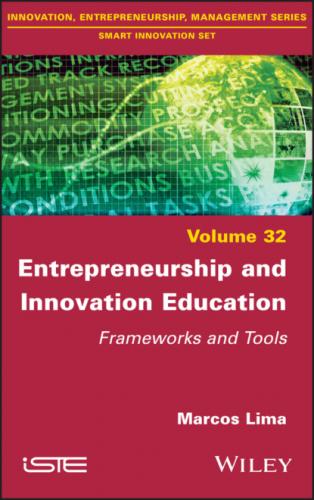Contents
1 Cover
6 1 E&I Education: An Overview 1.1. Defining entrepreneurship and innovation 1.2. Innovation and entrepreneurship education 1.3. Can entrepreneurship be taught? Towards a framework of E&I education 1.4. Collaborative Interactivity learning principles
7 2 From Idea to Vision 2.1. Self-knowledge: follow thy passion 2.2. Knowledge of the business field 2.3. Relationship networks 2.4. Other factors contributing to the development of the vision 2.5. Teaching the visionary theory
8 3 From Vision to Business Plan 3.1. Executive summary 3.2. Context: vision development 3.3. Literature review 3.4. Market analysis 3.5. Marketing plan 3.6. Organizational strengths and weaknesses 3.7. Other sources of competitive strengths and weaknesses 3.8. Strategy and development plan: the TOWS matrix 3.9. Financial objectives 3.10. Conclusions and perspectives 3.11. Appendices and References 3.12. Teaching business planning
9 4 From Business Plan to Business Model 4.1. Business models and business model artifacts 4.2. Claimed benefits and criticism of the BMC 4.3. Value flow in the Business Model Canvas 4.4. Sources of business model innovation 4.5. Visualizing business model innovation 4.6. Business modeling and the principle of effectuation 4.7. Testing business model innovations 4.8. Teaching business model innovation
10 5 From Business Model Design to Design Thinking and Lean Startup 5.1. New product development: the traditional stage-gate approach 5.2. Customer development 5.3. Design thinking 5.4. Lean startup 5.5. Teaching Design Thinking and Lean Startup
11 6 Scaling Up: The Challenges of Knowledge Management 6.1. An overview of management systems 6.2. The 7S framework for organizational analysis 6.3. Towards a framework for innovative knowledge management 6.4. Applying Terra’s framework: best practices from leading companies 6.5. Knowledge management in the ecosystem: Quintuple Helix and stakeholder maps 6.6. Teaching and learning knowledge management
12 7 Epilogue: Insights from Twenty Years of Teaching E&I 7.1. Learning by reflecting about authentic situations 7.2. Learning by collaboration 7.3. Learning by interacting through technology 7.4. Learning by exploring the ecosystem 7.5. From idea to market: innovative business development frameworks
13 Appendices Appendix 1: List of Tools and Frameworks Used in the Book Appendix 2: Framework for Evaluating the Effectiveness of Entrepreneurship Teaching Appendix 3: Sources of Secondary Data Appendix 4: Franco-Russian Research Project on the Perceived Relevance of Design Thinking Education
14 References
15 Index
